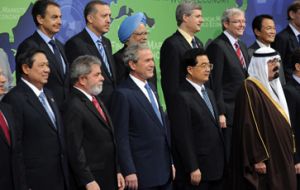MercoPress. South Atlantic News Agency
G20 summit vow to restore global economic growth
 G20 leaders have agreed not to implement new trade restrictions
G20 leaders have agreed not to implement new trade restrictions Leaders of the world's 20 largest economies have agreed to work together to restore economic growth and reform the world's financial system.
In a statement issued at the end of a summit in the US capital on Saturday, the G20 leaders, whose countries account for 85 per cent of the world economy, promised "vigorous efforts" to stabilise the global financial system. "We must lay the foundation for reform to help ensure that a global crisis, such as this one, does not happen again,'' the leaders said. "Our work will be guided by a shared belief that market principles, open trade and investment regimes, and effectively regulated financial markets foster the dynamism, innovation and entrepreneurship that are essential for economic growth, employment and poverty reduction." The G20 communique focused on regulating those areas of the financial markets which have exacerbated the crisis, boosting transparency in the often murky derivatives markets and reforming compensation practices. Financial planThe leaders also agreed to evaluate global accounting norms and the financing needs of international financial institutions. Finally, they have agreed to draw up a list of financial institutions whose collapse would imperil the global financial system. The plan said each country should act "as deemed appropriate to domestic conditions", but stopped short of imposing a co-ordinated international stimulus plan. "If you go through the document you see words like 'reform of financial markets', 'transparency', 'integrity' - it doesn't really amount to a hill of beans," John Terret, Al Jazeera's correspondent in Washington DC, said. "But what it does amount to is that we have seen for the first time under one roof here in Washigton DC, 20 of the key economic nations in the world. The crucial thing is that the emerging markets - the developing nations - are at the table as well. "I think that really is an indication of how this crisis is being seen around the world, particularly in America - it's serious and things have changed." Institutional reformGeorge Bush, the US president, said at the end of the summit that "both IMF and World Bank should modernise the structures". They ought to consider extending voting power and representation to developing nations. Particularly those who increased the contributions to the institutions. All this is an important first step," he said. In their concluding statement, G20 leaders also vowed to resolve trade disputes and to seek an agreement by the end of the year on how to rescue deadlocked global free trade negotiations known as "the Doha round". The Doha round of multilateral trade liberalisation talks was launched in the Qatari capital Doha in November 2001 under the auspices of the WTO, but has foundered since then amid disputes between developing and industrialised nations. "We underscore the critical importance of rejecting protectionism and not turning inward in times of financial uncertainty," said Bush. "In this regard, within the next 12 months, we will refrain from raising new barriers to investment or to trade in goods and services, imposing new export restrictions, or implementing World Trade Organisation inconsistent measures to stimulate exports. "Further, we shall strive to reach agreement this year on modalities that leads to a successful conclusion to the WTO's Doha Development Agenda with an ambitious and balanced outcome". Poverty push On Friday the European Commission urged world leaders to prioritise the fight against world poverty during the summit. "Poverty is the most urgent crisis facing the world," Louis Michel, the EU Development Commissioner, said in a statement. "The 'Bretton Woods II' summit in Washington [as Saturday's G20 summit has been called] offers a crucial opportunity to integrate the development dimension into the new international financial architecture," he said. Bretton Woods in New Hampshire was the location of a meeting where the World Bank and the International Monetary Fund (IMF) were set up in 1944. The financial crisis began when the US real estate market collapsed as a result of the subprime mortgage crisis, spreading swiftly to the financial sector. A cash crunch in the banking sector then caused the US credit market to seize up in mid-September, hurting businesses and sending stock markets spiralling downwards.




Top Comments
Disclaimer & comment rulesCommenting for this story is now closed.
If you have a Facebook account, become a fan and comment on our Facebook Page!